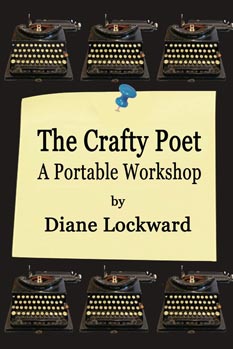This post contains affiliate links.
One of my favorite classes in college was a poetry writing workshop. Sometimes we did poetry prompts or exercises. Occasionally we read and analyzed poetry. But mostly we shared our poems and received feedback that would help us see the strengths and weaknesses in our work. And then we could make our poetry even better.
I’ve often wondered whether it would be possible to capture the experience of a writing workshop in a book. Since the key component of a workshop is interaction — giving and receiving feedback — I didn’t think it was possible.
But The Crafty Poet: A Portable Workshop comes pretty close. It’s an ideal book for a poetry workshop, but it’s also useful for individual poets who can’t attend a workshop or class.
The Portable Workshop: Contents
The book is well organized with each chapter focusing on a poetry-related topic:
- Generating Material / Using Time
- Diction
- Sound
- Voice
- Imagery / Figurative Language
- Going Deep / Adding Layers
- Syntax
- Line / Stanza
- Revision
- Writer’s Block / Recycling.
Quotes appear at the beginning of each chapter and serve to underscore its topic. Here’s one of my favorites:
“Follow your inner moonlight; don’t hide the madness.” — Allen Ginsberg
Each chapter also includes “Craft Tips,” short essays packed with insight, advice, and techniques that can be used to strengthen one’s poetry writing skills. One of the craft tips in the chapter on revision was called “The Spider Web, the Fishing Net, the Hammock” by Lee Upton:
“What all three physical forms have in common: strands connect around empty spaces. The silk or cord or rope resolves into a pattern that makes it possible for us to see the form and, at the same time, to see through the form. For a web or a net or a hammock to take shape, multiple strands must connect.”
Upton then continues with the spider web as a metaphor for a poem and some advice for revision:
“Where is the poem sticky in the worst sense? That is, where do the dead flies among your words cling to the poem? Where is the poem sticky in the best sense? That is, where does the imagination get caught and redeemed?”
Of course, The Crafty Poet wouldn’t be a portable workshop without including some poems. Each chapter includes a section called “Poem and Prompt,” which features a poem and a prompt based on that poem. However, the prompts in this book are more like exercises. They are comprehensive and robust, inspiring and educational. The prompts are followed by a few sample poems that show the prompt in action.
A particularly fun prompt called “The Negative Inversion Poem” asks you to use a poem by someone else and invert each line by stating the opposite:
“For example, next to How do I love thee? Let me count the ways, you might write: You know how I detest you. I need not enumerate.”
Each chapter also includes “The Poet on the Poem,” which provides a poem followed by a conversation between the poet and the book’s author. I found “The Poet on the Poem” to be particularly enlightening. This is where the book feels a lot like a workshop, because it examines a poem up close, with the poets revealing their inner thoughts about how the poem came into existence and sharing their creative processes for revising and polishing the poem.
Finally, each chapter includes a bonus prompt (again, the prompts are more like exercises) that will not only inspire poetry writing sessions but help poets develop technique.
The Crafty Poet
The Crafty Poet is not a book for beginners, although I don’t think beginners would have a difficult time with this book as long as they’re willing to look up words and concepts that are unfamiliar. The text assumes that the reader is already familiar with the language of poetry, including terms such as anaphora, acrostic poems, synecdoche, and enjambment. The book doesn’t provide definitions for these literary terms, although it uses them liberally. The reader is expected to either have knowledge of these terms or know where to get it.
The Crafty Poet is a must-have resource for more experienced poets who are familiar with literary devices, various forms of poetry, and the literary canon. Best of all, this book would be ideal for a poetry class or workshop, but any poet will find useful advice and activities within its pages.
After finishing the book, I found myself contemplating how closely it resembled the true experience of a workshop, and there’s one thing that would have made the text feel more like a workshop: it could have included poems with feedback on those poem and revisions of the poems. Still, The Crafty Poet does come close to echoing the experience of a poetry workshop.
 If you’re developing a poetry workshop or working with a poetry group, The Crafty Poet will be invaluable. But this book is also useful for poets flying solo, who want a text with a workshop flavor or who can’t access a formal workshop. The Crafty Poet is targeted toward intermediate poets, but beginners willing to pause to look up various terms will benefit from it.
If you’re developing a poetry workshop or working with a poetry group, The Crafty Poet will be invaluable. But this book is also useful for poets flying solo, who want a text with a workshop flavor or who can’t access a formal workshop. The Crafty Poet is targeted toward intermediate poets, but beginners willing to pause to look up various terms will benefit from it.



